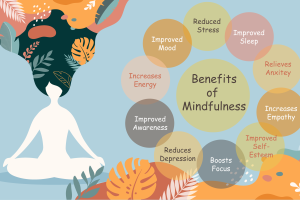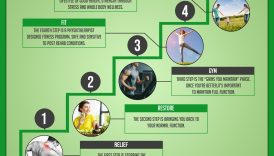The Journey to Your 7th Life: Nurturing a Healthy Body and Mind

Understanding the Concept of Reincarnation
Reincarnation is a fascinating belief that posits the soul’s journey through multiple lifetimes. Many cultures around the world embrace this notion, viewing life as an ongoing cycle where lessons learned in one life can carry over to the next. For instance, someone who faces challenges with anger in this life might return in another to face similar trials, offering them an opportunity to evolve spiritually. This perspective can encourage individuals to reflect on their actions and grow through their experiences.
- The Journey to Your 7th Life: Nurturing a Healthy Body and Mind
- Understanding the Concept of Reincarnation
- Importance of Nurturing a Healthy Body and Mind
- Exploring Past Lives
- Techniques for Past Life Regression
- Learning from Past Life Experiences
- The Mind-Body Connection
- Holistic Approaches to Health
- Balancing Mental and Physical Well-being
- Practices for Inner Growth
- Meditation and Mindfulness
- Self-care Routines for Spiritual Development
- Nutritional Foundations for Wellness
- Importance of a Balanced Diet
- Superfoods for Nourishing the Body and Mind
- Physical Fitness and Mental Health
- Benefits of Exercise on Psychological Well-being
- Creating a Sustainable Fitness Routine
- Healing Therapies for Body and Mind
- Traditional and Alternative Healing Modalities
- Finding the Right Therapy for Personal Growth
- Embracing Mindfulness in Daily Life
- Practicing Presence and Gratitude
- Mindful Living for Inner Peace
- Building Resilience and Coping Strategies
- Strategies for Overcoming Challenges
- Developing Emotional Resilience for Life's Obstacles
- Connecting with Nature for Health and Well-being
- Benefits of Ecotherapy
- Nature-based Activities for Mindful Living
Importance of Nurturing a Healthy Body and Mind
To navigate these varied lifetimes with grace, nurturing both body and mind is crucial. An emphasis on holistic health can significantly enhance one’s ability to cope with life’s transitions. Here are a few benefits of maintaining a balanced approach:
- Improved Mental Clarity: A healthy body can lead to a more focused mind, helping individuals make better decisions.
- Emotional Stability: Regular physical activity and nutritious eating habits can reduce stress and anxiety levels.
- Increased Energy Levels: A well-rounded diet and exercise routine can boost overall energy, enabling one to engage more fully in life’s experiences.
Ultimately, fostering a connection between the body and mind can set the stage for personal growth, both in this life and beyond.
Exploring Past Lives
Techniques for Past Life Regression
Exploring past lives can be a transformative journey that reveals insights into one’s current life experiences. There are several effective techniques for past life regression, each offering a unique pathway to uncover buried memories. Some popular methods include:
- Guided Meditation: This technique involves a trained facilitator who guides individuals through a relaxed state, prompting them to visualize past experiences.
- Hypnotherapy: Professional hypnotherapists can help clients access their subconscious, revealing memories from past incarnations that may impact present behaviors.
- Dream Analysis: Keeping a dream journal can unveil symbols or themes connected to past lives, illuminating unresolved issues.
Learning from Past Life Experiences
Engaging with past life memories allows individuals to learn invaluable lessons that can inform their current lives. For example, someone who discovers they were a healer in a previous life might feel a calling to help others today. Here are some benefits of learning from past life experiences:
- Understanding Patterns: Recognizing recurring patterns can aid in breaking negative cycles.
- Emotional Healing: Revisiting emotional traumas can provide a means to heal and release lingering pain.
- Enhanced Self-awareness: Gaining insights into one’s past can foster greater empathy and understanding towards oneself and others.
By delving into these past experiences, individuals can create a more enriching and mindful present.
The Mind-Body Connection
Holistic Approaches to Health
Building on the insights gained from revisiting past lives, the mind-body connection serves as a profound reminder that emotional and physical health are intertwined. Holistic approaches to health recognize this relationship, emphasizing the importance of nurturing both aspects. Here are some strategies to consider:
- Yoga and Tai Chi: These practices promote flexibility and strength while also calming the mind, fostering a deep connection between body and spirit.
- Alternative Therapies: Techniques like acupuncture or Reiki can balance energy levels, alleviating stress and physical discomfort simultaneously.
- Aromatherapy: Utilizing essential oils can enhance mood and relaxation, enabling a holistic healing experience.
Balancing Mental and Physical Well-being
Finding equilibrium between mental and physical health is essential for overall wellness. For instance, when grappling with anxiety, engaging in regular physical activity can be incredibly beneficial. Exercise releases endorphins, which improve mood and alleviate stress. Consider these tips for achieving balance:
- Mindful Eating: Pay attention to food choices, opting for nourishing options that fuel both body and mind.
- Regular Check-ins: Set aside time each week to assess emotional and physical states, adjusting routines as needed.
- Quality Sleep: Prioritize restorative sleep to regenerate both physical health and mental clarity.
By embracing these holistic strategies, individuals can cultivate a harmonious mind-body relationship, essential for navigating life’s challenges with resilience and grace.
Practices for Inner Growth
Meditation and Mindfulness
Continuing the journey towards a balanced mind-body connection, the practices of meditation and mindfulness play a vital role in fostering inner growth. These techniques help cultivate awareness and enhance emotional resilience. For example, dedicating just a few minutes each day to meditation can create a serene space for reflection. Here are a few methods to incorporate into daily life:
- Guided Meditations: These can be found in many mobile apps and provide a structured approach for beginners.
- Breath Awareness: Focusing on your breath can ground you in the present and reduce anxious thoughts.
- Mindful Walks: Taking a nature walk while being fully aware of your surroundings allows for a meditative experience.
Self-care Routines for Spiritual Development
Complementing meditation, self-care routines are essential for spiritual growth. Engaging in activities that nourish the soul can lead to profound shifts in perspective. For instance, setting aside time for journaling or creative expression can help process feelings and encourage deeper understanding. Consider these self-care practices:
- Digital Detox: Stepping away from screens allows for quiet reflection and reconnecting with oneself.
- Nature Connection: Spending time outdoors can refresh your spirit and promote feelings of gratitude.
- Creative Outlets: Painting, writing, or dancing can unleash emotions and help articulate your inner self.
Integrating these practices not only fosters personal development but also invites deeper connections with oneself and the world around.
Nutritional Foundations for Wellness
Importance of a Balanced Diet
As we continue our journey towards inner growth, nutritional foundations become crucial in supporting our mind and body. A balanced diet serves as the fuel for overall wellness, influencing energy levels, mood, and mental clarity. Think of it as providing your body with the right tools to thrive. For instance, after switching to a diet rich in whole foods, many individuals report enhanced focus and vitality. Key components of a balanced diet include:
- Fruits and Vegetables: Aim for a colorful variety to ensure a wide range of nutrients.
- Whole Grains: Incorporate quinoa, brown rice, and oats for lasting energy.
- Lean Proteins: Include sources such as fish, poultry, beans, and nuts to support muscle function.
Superfoods for Nourishing the Body and Mind
In addition to a balanced diet, incorporating superfoods can elevate your nutrition game. These nutrient-rich foods offer exceptional health benefits that support physical and mental well-being. For example, adding blueberries to your morning smoothie can boost brain health due to their high antioxidant content. Here are some superfoods to consider:
- Kale: Packed with vitamins A, C, and K, this leafy green promotes cognitive function.
- Salmon: Rich in omega-3 fatty acids, it enhances mood and supports heart health.
- Chia Seeds: Loaded with fiber and protein, chia seeds can stabilize blood sugar and keep you feeling full.
By making these nutritional choices, individuals can lay a solid foundation for both a healthy body and a centered mind, setting the stage for holistic well-being.
Physical Fitness and Mental Health
Benefits of Exercise on Psychological Well-being
Building upon the nutritional foundations for wellness, physical fitness plays a significant role in enhancing mental health. Numerous studies show that regular exercise can alleviate symptoms of anxiety and depression, providing a natural mood boost. For example, after committing to a daily walk, many individuals experience increased clarity and decreased stress levels—something that can only be attributed to the endorphins released during physical activity. Here are some key benefits to consider:
- Increased Energy Levels: Regular exercise combats fatigue and enhances overall vitality.
- Improved Sleep Quality: Physical activity can promote deeper and more restorative sleep.
- Enhanced Self-esteem: Completing workouts can boost confidence and foster a positive self-image.
Creating a Sustainable Fitness Routine
To fully benefit from these psychological enhancements, creating a sustainable fitness routine is essential. It’s important to choose activities that resonate with personal interests and lifestyle, making it easier to stay committed. Consider these tips for establishing a routine:
- Start Small: Begin with 15-20 minutes of exercise a few times a week and gradually increase intensity and duration.
- Incorporate Variety: Mix different activities such as yoga, running, or dance to keep things fun and engaging.
- Set Realistic Goals: Focus on achievable milestones, celebrating progress along the way to stay motivated.
By connecting physical fitness with mental well-being, individuals can enhance their quality of life and create a joyful, lasting routine that nurtures both body and mind.
Healing Therapies for Body and Mind
Traditional and Alternative Healing Modalities
As we delve deeper into the journey of nurturing both physical fitness and mental health, exploring healing therapies becomes vital for overall well-being. Traditional healing modalities, such as psychotherapy and acupuncture, have long proven effective in addressing various health issues. On the other hand, alternative therapies like Reiki and aromatherapy offer holistic healing opportunities that can enhance the mind-body connection. Consider the following therapies:
- Cognitive Behavioral Therapy (CBT): A structured approach to manage anxiety and improve emotional regulation.
- Acupuncture: This ancient practice stimulates specific points on the body to promote healing and balance.
- Mindfulness-Based Stress Reduction (MBSR): A program combining mindfulness meditation and yoga to reduce stress.
Finding the Right Therapy for Personal Growth
With countless options available, selecting the appropriate therapy for personal growth can feel overwhelming. It’s essential to consider personal preferences and individual needs. Here are some tips to help in the process:
- Research Thoroughly: Explore various therapies to understand their principles and potential benefits.
- Listen to Your Body: Pay attention to how you feel after trying a therapy; alignment with your needs is key.
- Seek Guidance: Consulting with a healthcare professional can provide valuable insights into the best approach for your personal journey.
By exploring and embracing the right healing modalities, individuals can facilitate profound transformation, enhancing both emotional resilience and overall vitality.
Embracing Mindfulness in Daily Life
Practicing Presence and Gratitude
Transitioning from healing therapies to daily routines, embracing mindfulness can greatly enhance overall well-being. Practicing presence allows individuals to fully engage with each moment, fostering a deeper appreciation for life around them. One effective method to cultivate this is through gratitude journaling. Each day, individuals can jot down three things they are thankful for, transforming their mindset towards positivity. Consider these simple practices to integrate presence and gratitude into daily life:
- Mindful Morning Rituals: Start each day with awareness, whether it’s sipping coffee slowly or taking a moment to enjoy the sunrise.
- Gratitude Breaks: Set reminders to pause throughout the day, acknowledging small blessings and experiences.
Mindful Living for Inner Peace
Incorporating mindfulness into everyday activities not only promotes awareness but also paves the way for inner peace. Mindful eating is an excellent practice for this—taking the time to savor each bite can transform the simple act of eating into a meditative experience. Here are a few tips to promote mindful living:
- Limit Multitasking: Focus on one task at a time to improve concentration and reduce stress.
- Embrace Nature: Take regular walks outside, immersing yourself in the sights and sounds of the environment.
- Establish Evening Reflection: Before bed, reflect on the day’s experiences, reinforcing gratitude and closure.
By embedding mindfulness into daily practices, individuals can cultivate a serene existence that nurtures both body and spirit, leading to a more fulfilling life.
Building Resilience and Coping Strategies
Strategies for Overcoming Challenges
As we weave mindfulness into our lives, the next critical step is building resilience and implementing effective coping strategies. Life inevitably brings challenges, but with the right tools, individuals can navigate these obstacles with grace. For instance, adopting a problem-solving mindset can transform setbacks into growth opportunities. Some strategies to consider include:
- View Challenges as Opportunities: Shift your perspective to see difficulties as chances to learn and grow.
- Develop a Support System: Surround yourself with friends and family who provide encouragement and understanding during tough times.
- Practice Self-Compassion: Be kind to yourself amidst struggles, recognizing that everyone faces challenges.
Developing Emotional Resilience for Life’s Obstacles
Building emotional resilience is essential for bouncing back from adversity. It allows individuals to manage stress and maintain mental well-being. A personal experience might include overcoming a significant life change, such as a job loss, and using it as a catalyst for new opportunities. To enhance emotional resilience, consider these approaches:
- Mindfulness Meditation: Regular practice can help center your thoughts and reduce anxiety when facing challenges.
- Set Realistic Goals: Break tasks into manageable steps, encouraging a sense of accomplishment with each small success.
- Reflect on Past Resilience: Keep a journal where you document past challenges and how you overcame them, reminding yourself of your strength.
By incorporating these strategies into daily life, individuals can fortify their resilience, enabling them to handle life’s obstacles with confidence and composure.
Connecting with Nature for Health and Well-being
Benefits of Ecotherapy
Continuing the journey of resilience and emotional balance, connecting with nature offers profound health benefits that elevate overall well-being. Ecotherapy, a therapeutic practice that takes advantage of the healing power of the natural world, provides individuals with an opportunity to recharge mentally and emotionally. The mere presence of nature can reduce stress levels, improve mood, and promote feelings of tranquility. Consider these key benefits:
- Enhanced Mood: Spending time outdoors can increase serotonin levels, often leading to reduced anxiety and depression.
- Improved Focus: Nature exposure can enhance cognitive function and creativity, offering a mental reset.
- Physical Health Boost: Activities in nature, such as hiking or gardening, encourage physical movement and overall fitness.
Nature-based Activities for Mindful Living
Incorporating nature into daily life is a wonderful way to practice mindful living and restore balance. Engaging in activities outdoors helps cultivate a sense of presence and connection with the environment. For instance, going for a walk in a nearby park isn’t just an opportunity for exercise but an invitation to experience the beauty of the moment. Here are some nature-based activities to consider:
- Forest Bathing: Spend time in a forest setting, immersing yourself in the sights and sounds of nature for relaxation.
- Gardening: Cultivate your own garden; connecting with plants can be a meditative experience that fosters mindfulness.
- Nature Journaling: Document your outdoor experiences through writing or sketching; this practice encourages reflection and creativity.
By embracing nature in our routines, we can nurture our health and well-being, creating a harmonious balance that resonates deeply within us.





